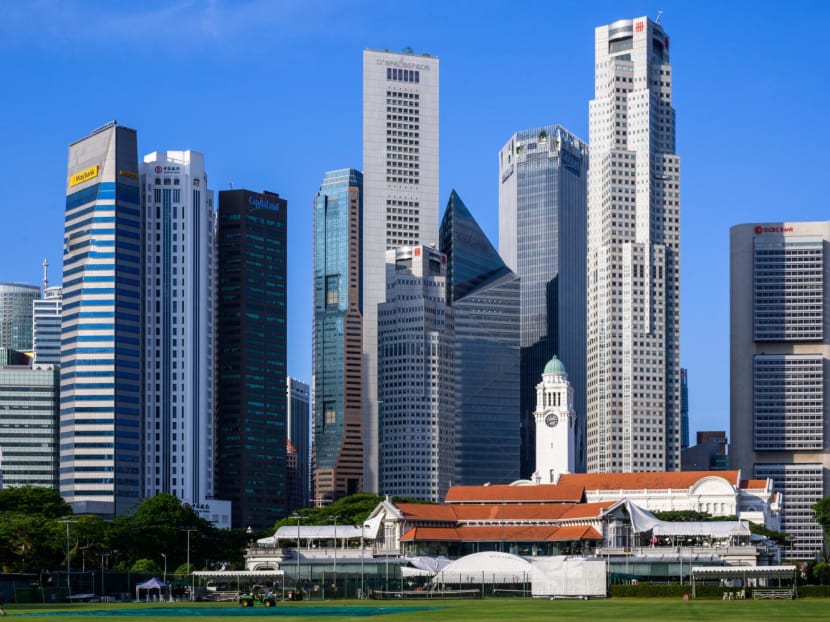Singapore's core inflation holds steady at 5.1% in November; set to stay elevated for next few quarters
SINGAPORE — Singapore's core inflation held steady at 5.1 per cent year-on-year in November, the same rate as the previous month.
SINGAPORE — Singapore's core inflation held steady at 5.1 per cent year-on-year in November, the same rate as the previous month.
This was because smaller increases in the costs of services, and electricity and gas were broadly offset by a steeper pickup in the costs of retail and other goods and food, said the Monetary Authority of Singapore (MAS) and the Ministry of Trade and Information (MTI) on Friday (Dec 23).
Core inflation excludes accommodation and private transport costs.
The headline consumer price index, or overall inflation, also remained unchanged in November at 6.7 per cent. On a month-on-month basis, core inflation increased marginally by 0.2 per cent and overall inflation by 1 per cent.
Core inflation is projected to stay elevated in the next few quarters before slowing "more discernibly" in the second half of next year as the current tightness in the domestic labour market eases and global inflation moderates, said MAS and MTI.
For 2022 as a whole, overall inflation is expected to average about 6 per cent and core inflation about 4 per cent.
Services inflation eased to 3.6 per cent in November from 3.9 per cent the preceding month, mainly on account of a smaller increase in airfares.
Electricity and gas inflation fell to 16.7 per cent in November from 19 per cent in October, partly due to the higher base a year ago.
In November last year, some households whose Open Electricity Market retailers had exited the market were transferred to SP Group. This contributed to a rise in electricity costs in November 2021 as the regulated tariff charged by SP Group was generally higher.
Food inflation rose slightly to 7.3 per cent in November on account of higher food services inflation.
The cost of retail and other goods picked up more strongly, going up from 2.6 per cent in October to 3.3 per cent in November. This was due to steeper increases in the prices of clothing and footwear, personal care products, as well as medicines and health products, said MAS and MTI.
Accommodation inflation edged down to 4.8 per cent in November from 4.9 per cent the preceding month, as housing rents rose at a more gradual pace.
Private transport inflation slowed to 17.2 per cent in November, in line with smaller increases in car and petrol prices.
OUTLOOK
"Demand conditions in major economies have softened while supply chain frictions have continued to ease," said MAS and MTI.
"Prices of energy and food commodities have come off the peaks reached earlier in the year, but remain firm given ongoing supply constraints."
Labour markets in major advanced economies are still tight, with wage pressures strong.
Accordingly, Singapore's imported inflation across a range of goods and services is expected to "remain significant for some time", said the agencies.
In Singapore, unit labour costs are expected to increase further in the near term alongside robust wage growth. At the same time, the cost of utilities is likely to remain high.
"Firms are expected to continue to pass through accumulated import, labour and other business costs to consumer prices amid resilient demand," MTI and MAS said.
Car and accommodation cost increases are anticipated to "stay firm" in the quarters ahead amid tight COE quotas for cars and strong demand for rental housing.
In 2023, taking into account all factors including the GST increase, headline inflation is projected to average 5.5 per cent to 6.5 per cent, while core inflation is forecasted to come in at 3.5 per cent to 4.5 per cent.
"Excluding the transitory effects of the GST hike, headline and core inflation are expected to come in at 4.5 to 5.5 per cent and 2.5 to 3.5 per cent, respectively," said MAS and MTI.
"There are upside risks to the inflation outlook, including from fresh shocks to global commodity prices and more persistent-than-expected external inflation." CNA
For more reports like this, visit cna.asia.







